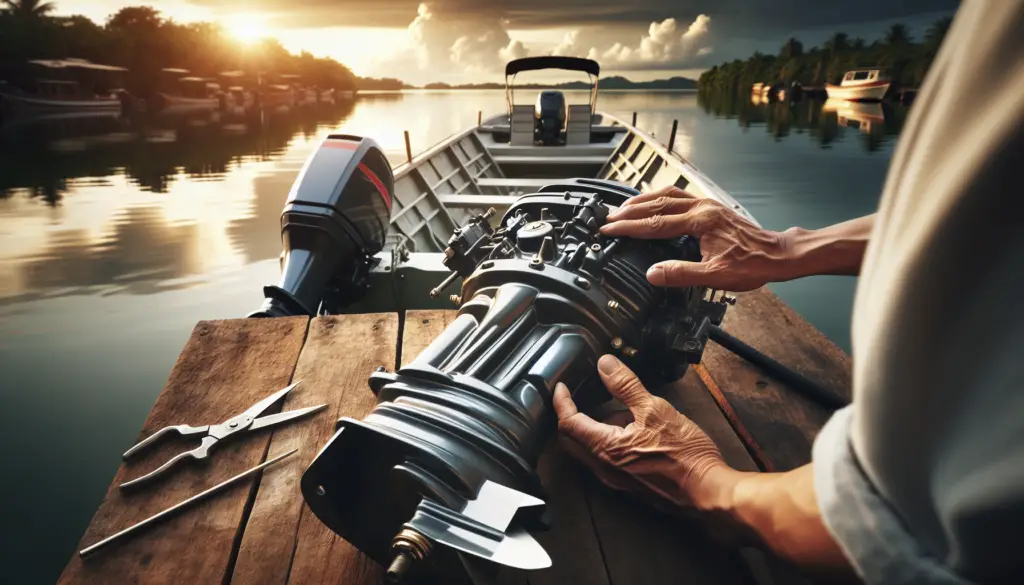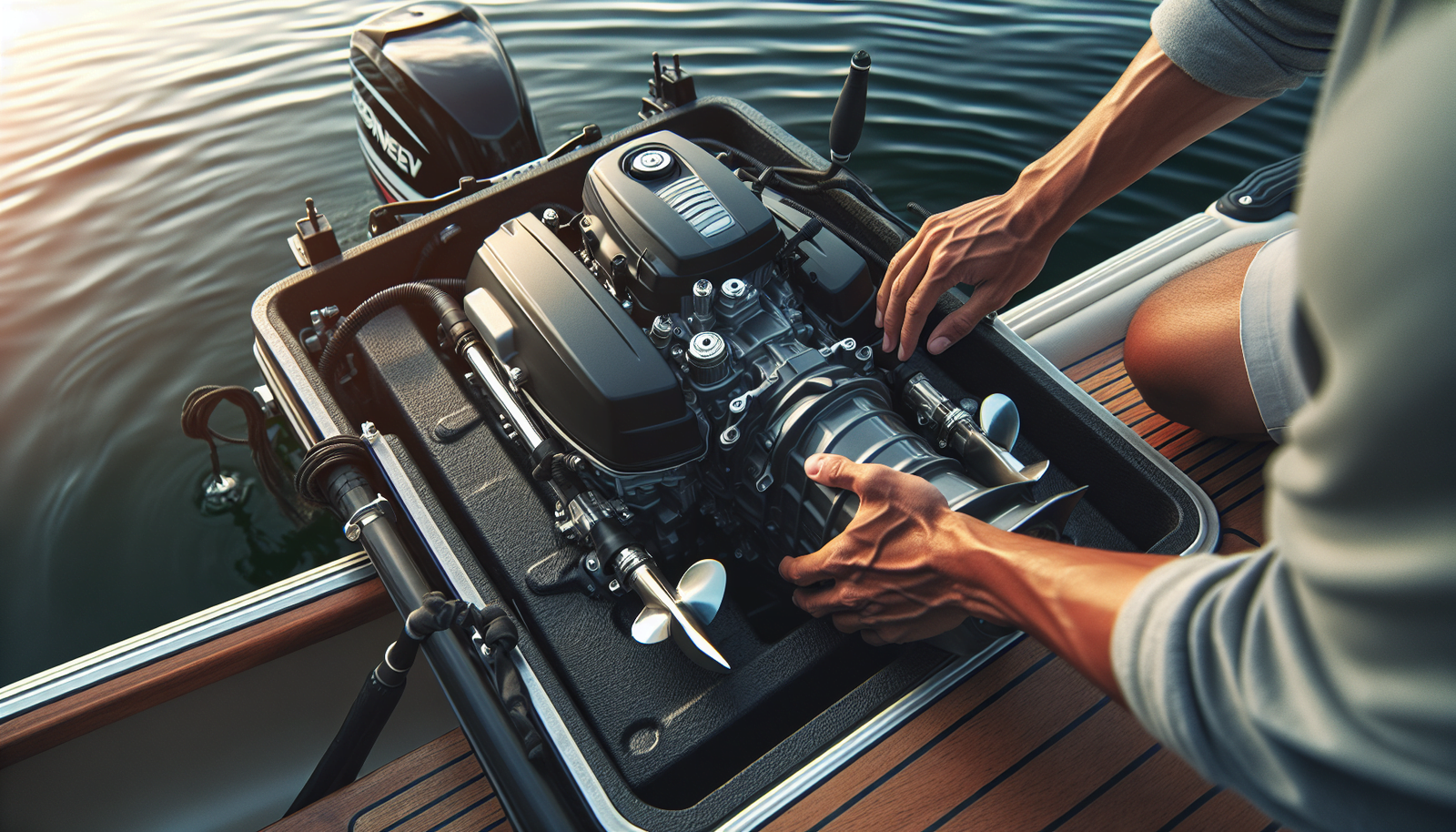Embarking on a boat trip is always an exciting adventure, but it wouldn’t be as soothing if an unexpected engine problem arises in the middle of the sea. “Best Ways To Perform Routine Boat Engine Checks” is poised to help you keep such unpleasant surprises at bay. The article guides you through straightforward, easy-to-follow guidelines on maintaining and examining your boat’s engine regularly. Don’t worry if you’re not a seasoned mechanic; this article breaks down the steps in a way that’s comfortably understandable for anyone. So, prepare yourself to gain essential knowledge that could save your day on the water.

Understanding the Importance of Routine Boat Engine Checks
Routine boat engine checks are not something to be taken lightly. The importance of this procedure reaches far beyond mere maintenance. It directly impacts several aspects of your boating experience.
Maintaining Engine Performance
Proper engine performance is not just about speed on the water, but it is a primary factor contributing to optimal fuel efficiency. Just like with a car, a well-maintained boat engine operates at its best when it’s well cared for. Routine checks ensure that any issues that might hinder performance are caught early and addressed before they cause significant problems.
Ensuring the Safety of the Vessel
Safety should always be your top priority when you’re out on the water. A regular engine inspection helps ensure that your boat is running smoothly, preventing worst-case scenarios like a stalled engine in the middle of a large body of water. Knowing that your engine is in good shape provides peace of mind on any voyage, no matter the distance.
Extending the Life of the Boat Engine
Finally, routine engine checks prolong the life of your boat engine. This not only saves you the significant cost of an engine replacement but also extends the longevity of your entire boat as well.
Getting Acquainted with the Boat Engine Manual
The boat engine manual is your primary source of information about your specific engine. Knowing your manual inside out is invaluable when conducting routine checks.
Understanding Specific Engine Requirements
Every boat engine is different, and each has its specific requirements when it comes to checks and maintenance. The engine manual provides all the details, from the appropriate oil type to the exact parts that need regular inspection.
Recognizing the Importance of Manufacturer Instructions
Ignoring manufacturer instructions can result in damage to your engine or even void the warranty. Manufacturer instructions are based on extensive testing and engineering knowledge, so they’re the most accurate guidelines you can follow.
Identifying Different Parts of the Engine
A boat engine’s different parts each have their purpose and maintenance schedule. The engine manual will help you identify these parts and educate you on their function and maintenance requirements.
Preparing for the Engine Check
Ready to start your engine check? Great! But first, you’ll need to prepare.
Gathering Necessary Equipment
Ensuring that you have all the tools and equipment necessary for an engine check is crucial. This includes items such as wrenches, screwdrivers, oil, diagnostics tools, and other necessary items outlined in your engine manual.
Securing Necessary Safety Gear
Safety gear such as gloves, goggles, and appropriate attire protects you during the engine maintenance process. Engine checks might involve handling harmful substances like engine coolant, making your safety gear indispensable.
Setting the Appropriate Schedule for Checks
Frequency of engine checks varies depending on the engine’s age, usage, and type. The manufacturer’s guidelines are a good starting point, but it’s wise to adjust as needed based on your specific engine and usage.

Checking Engine Oil
Engine oil checks are fundamental in any engine maintenance routine.
Testing Oil Levels
Testing oil levels often helps ensure that your engine operates smoothly. Oil levels in boat engines can deplete rapidly or can become contaminated due to environmental factors. Regular checks allow you to keep the level within the manufacturer’s recommended range.
Evaluating Oil Condition
When checking oil levels, also assess the oil’s condition. If it appears cloudy, overly viscous, or contains visible debris, it’s a good idea to change it, as this could indicate a serious engine problem.
Understanding When to Change Engine Oil
Frequency of engine oil change depends on use, engine age, and manufacturer recommendations. As a good rule of thumb, replace the engine oil at the very least once a year, or after every 100 hours of engine operation.
Inspecting the Cooling System
The cooling system works continuously to prevent the engine from overheating, an essential role to maintaining engine performance.
Evaluating the Condition of the Coolant
Coolant breaks down over time and can become contaminated with debris or rust, affecting its ability to cool the engine. Regularly inspect the coolant to ensure it’s in good condition and replace it if you notice any issues.
Checking the Functionality of the Water Pump
The water pump drives the coolant in your engine. Regular checks ensure that the pump is functioning correctly and efficiently circulating the coolant.
Inspecting for Leaks in the Cooling System
Coolant leaks can lead to engine overheating and severe damage. During your check, inspect hoses, seals, and other components of the cooling system for signs of leakage.
Reviewing the Fuel System
Your boat’s fuel system delivers the essential fuel to your engine. Regular checks ensure that it is in optimal condition and that your engine is receiving clean, uncontaminated fuel.
Assessing Overall Fuel Line Health
Fuel lines are essential conduits that carry fuel from the tank to the engine. Look for signs of wear, damage, clogging, or leaks to avoid possible engine issues or fuel loss.
Inspecting the Fuel Filter
A clogged or dirty fuel filter can restrict fuel flow to the engine, decreasing your boat’s performance. Regular checks and timely replacement of the filter is an important part of your routine engine check.
Checking for Signs of Fuel Leaks
Fuel leaks can be a significant hazard on a boat, posing safety risks and reducing fuel efficiency. Be vigilant in checking for signs of fuel leaks during your engine check.
Evaluating the Electrical System
From starting the boat’s engine to powering onboard systems, your boat’s electrical system plays an integral role in its overall operation.
Testing the Battery and Alternator
The battery and alternator are like the heart and lungs of your boat’s electrical system. Regular testing ensures they are in good working order and able to deliver the necessary power.
Checking all Electrical Connections
Loose or corroded electrical connections can lead to a system failure. Regular checks allow you to identify and correct any loose or corroded connections before they lead to bigger problems.
Assessing the Condition of Wiring and Fuses
Inspect wiring for any signs of damage or wear, and check your fuses to ensure none have blown. This not only ensures a functional electrical system but can prevent potential fire hazards as well.
Inspecting Belts and Hoses
Belts and hoses are crucial to your engine’s operation, and they need to be in top shape to function effectively.
Checking for Signs of Wear and Tear
Belts can become cracked, frayed, or stretched over time, while hoses can split, crack, or harden. Regular inspection can help catch these issues before they lead to engine problems.
Ensuring Proper Tension in Belts
Belts in your engine need to be properly tensioned to work correctly. Too tight, and they can cause unnecessary wear to connected components, too loose, and they fail to work effectively. Regular checks ensure they remain at the right tension.
Checking for Leaks in Hoses
Leaks in hoses can lead to loss of important fluids such as oil or coolant. Regular inspection facilitates timely repair or replacement of hoses, preventing such issues.
Examining the Propeller and Lower Unit
Your boat engine doesn’t operate in isolation—its operation aligns with other elements of your boat, including the propeller and lower unit.
Looking for Visible Damage to the Propeller
Continuous use can result in chips, dents, or bends in the propeller that hinder its performance. Regular visual checks help detect any damage that needs to be addressed.
Checking the Seals of the Lower Unit
Leaks in the lower unit can lead to loss of gear oil, which can affect the lubrication of your gears, leading to premature wear or even gear failure. Regular checks help ensure seals are intact and functioning correctly.
Ensuring Correct Gear Oil Levels
Check gear oil levels regularly to make sure they’re within the recommended range. Low gear oil levels can cause excessive wear on the gears; discolored oil could indicate water contamination, signaling the need for immediate attention.
Recording and Addressing Observations
Keeping a record of your observations during engine checks is crucial for future checks and for condensing the data into actionable insights.
Maintaining a Log of Engine Checks
A log serves as a handy document showing the history of engine checks, findings, and actions taken. This can be useful when diagnosing engine problems, tracking recurring issues, and verifying regular maintenance.
Seeking Professional Help for Significant Issues
While routine checks can prevent many common engine problems, don’t hesitate to seek professional help for significant issues. No one knows your engine better than the trained and experienced professionals.
Developing a Routine Maintenance Plan Based on Checks
Your observations during engine checks should guide your routine maintenance plan. Regular checks will reveal the frequently occurring issues, which need to be a part of your routine. This way, your plan will be tailored to your boat engine’s specific needs, contributing to its longer life and better performance.


[…] plugs, oil filters, belts, and hoses, need regular checks. Also, it’s crucial to monitor the fuel system, keep an eye on the cooling system and examine the exhaust […]
[…] Regular inspection is crucial to your boat’s engine maintenance. […]